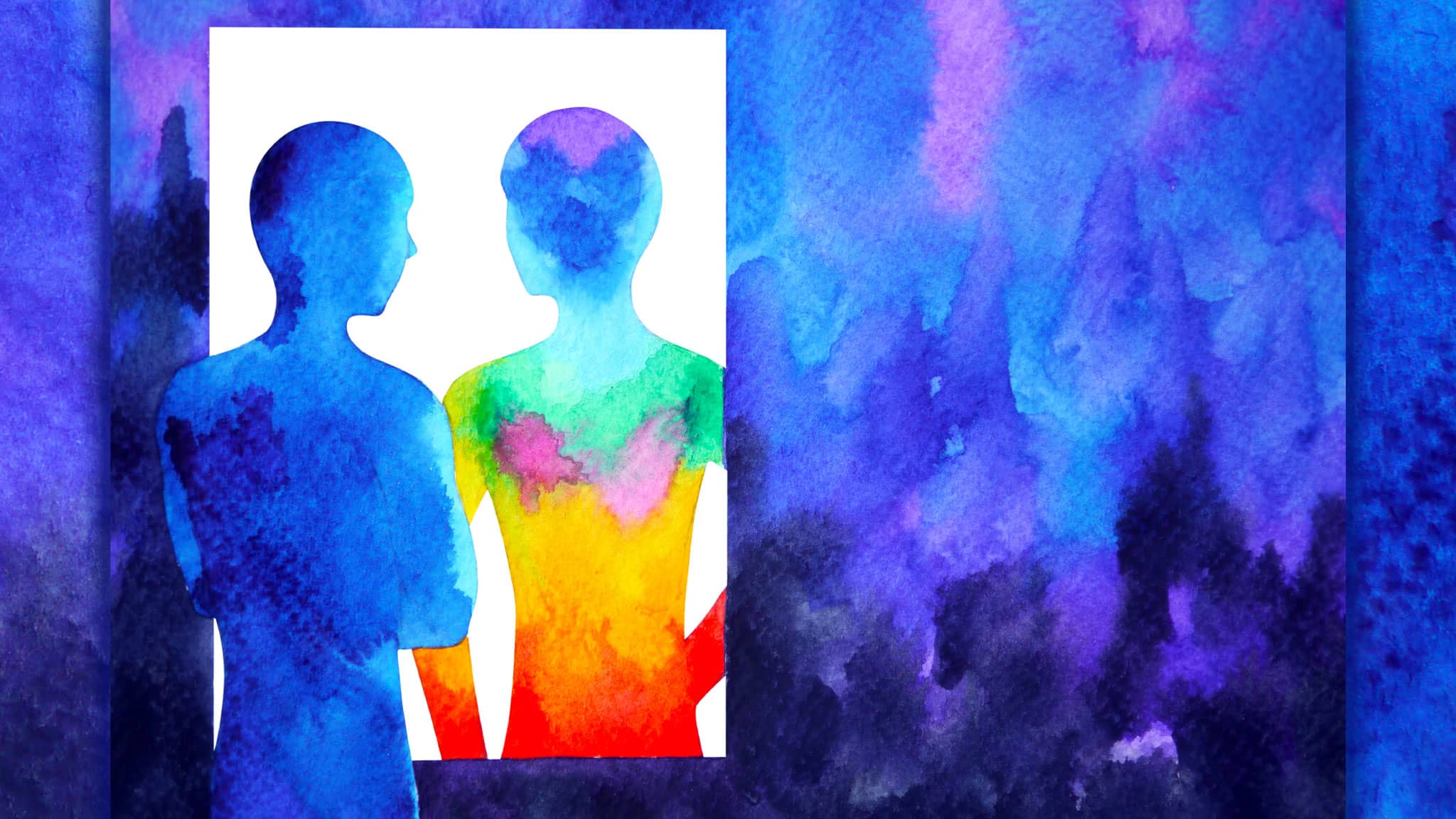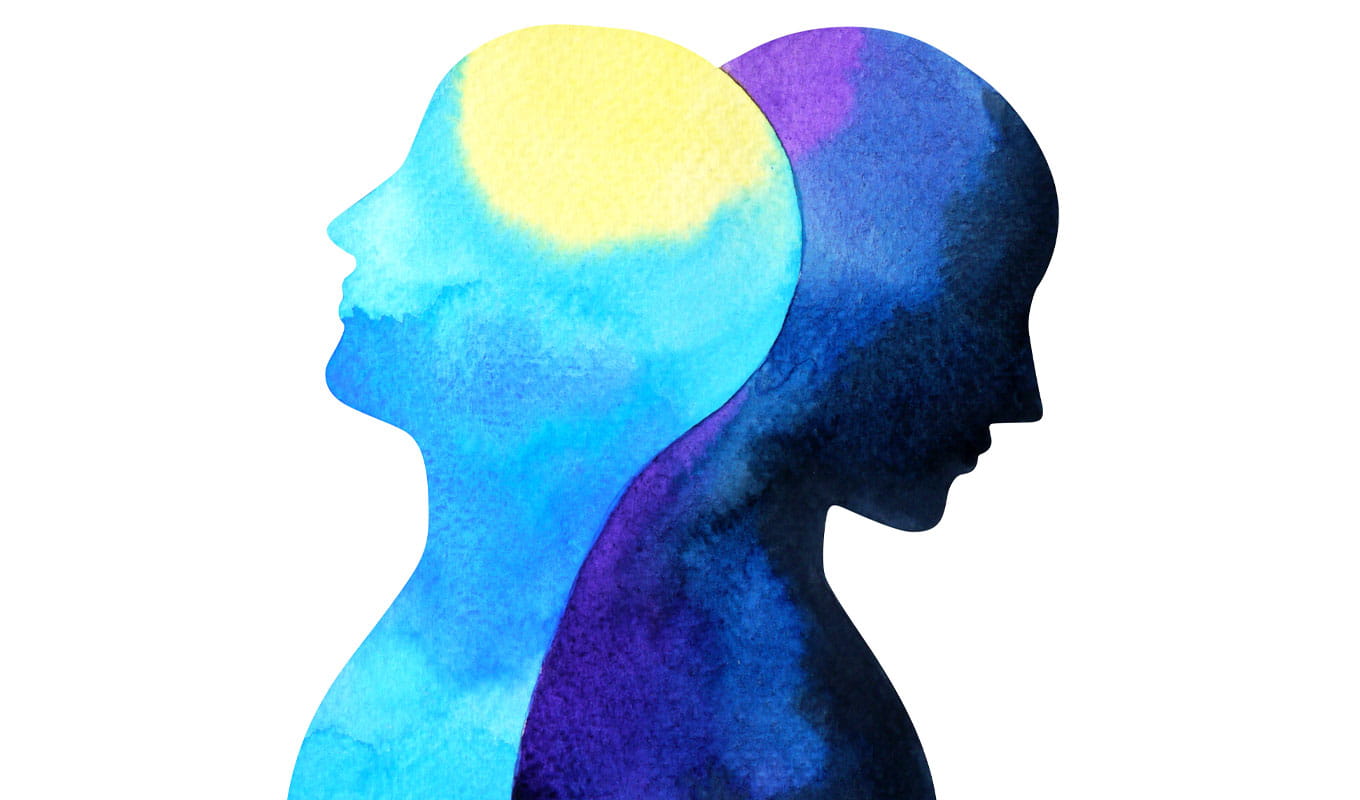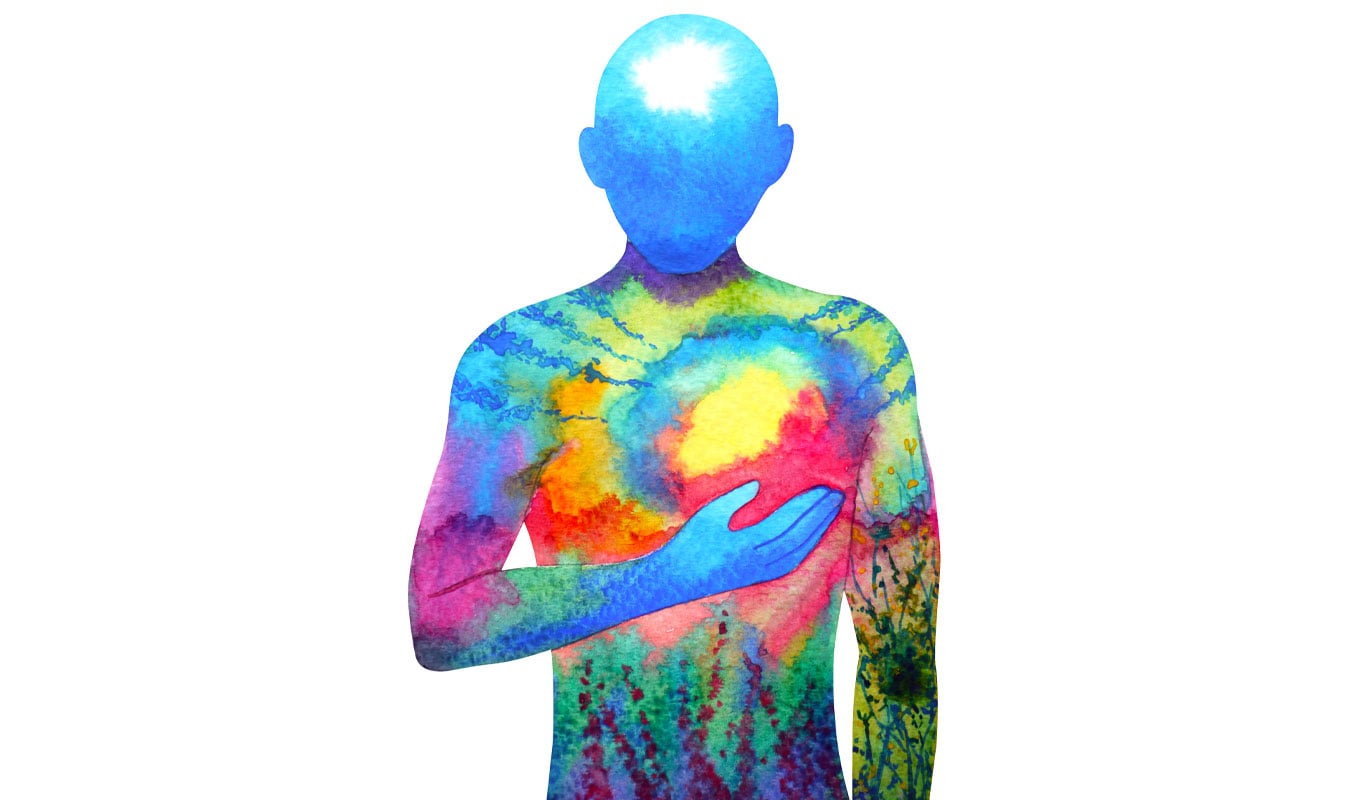Bipolar Loneliness Can Be Crippling, But It Doesn’t Have To Be

Bipolar disorder, formerly called “manic-depression,” often presents as a back-and-forth cycle of depression and mania and it can be a lonely experience.
Key Takeaways:
- Although loneliness does not cause bipolar disorder, it can certainly make a person feel lonely for many reasons.
- The depressive episodes of bipolar disorder occur about three times as often as manic episodes; recognizing your illness and understanding how bipolar disorder works is the first step managing your feelings of loneliness.
- Many bipolar patients, myself included, have done so with conscientious living and a continuous eye on evaluating our moods and symptoms.
Struggling with loneliness or having a mental health crisis?
- Suicide Prevention Lifeline: 1-800-273-TALK (8255); Deaf or hard of hearing dial 711 before the number or connect via online chat
As a person diagnosed with bipolar disorder, I can tell you that it sucks.
The dreadful lows, the manic highs, the feeling of not being able to trust my own mind — those things are the core of bipolar illness and they can lead to feelings of loneliness that may feel insurmountable.
In addition to the impact of the illness on your own life, bipolar disorder can also wreak havoc on our jobs, our living situation, and our family and personal relationships.
That can lead to isolation, confusion, frustration, and yes — unbearable loneliness.
Even so, it is possible to reclaim your life, and your happiness.
What Is Bipolar Disorder & How Does It Create Loneliness?

Although the cause is unknown, bipolar disorder may be the result of physical changes within the brain, with a possible genetic link that has yet to be discovered.
The depression side of bipolar disorder often involves a lack of motivation, inability to focus or be productive, hopelessness, and even suicidal ideation.
Left untreated, depression has a mortality rate of about 14 deaths from suicide per 100,000 people who suffer from it.
Mania is a bit more complicated.
It may present as extreme elation, feelings of invincibility, or a desire to make a huge or sweeping change in life — like getting married or divorced, having a child, quitting a job, moving to a new town, or spending lots of money on a new idea you’re sure will make you a fortune.
(It probably won’t. But you’ll be convinced that it will nonetheless.)
Mania can also involve high-energy anger, outbursts, even violence. What this means is that a person caught in a manic spiral may hurt another individual rather than themselves.
In patients with bipolar disorder, mania and depression cycles can be rapid or may only occur once or twice a year — usually with intense severity.
Although the illness directly affects the individual suffering from it, it can inadvertently impact those around them — and our struggles with bipolar loneliness can stem from both.
Although loneliness will not cause bipolar, this mental illness can certainly make a person feel lonely for many reasons.
Bipolar loneliness may arise from:
- Feelings of sadness or hopelessness
- Believing we’ve disappointed everyone we know
- Fear that our family and friends don’t actually like us
- Internalized shame — deserved or not
- Being convinced that we’re not performing well at work
- Worrying that everyone is coddling us so we don’t have “another breakdown”
- The fear that friends or family are tired of us and our condition
- Impostor syndrome — feeling like you’re a fraud
- Being immobilized by not knowing how to move forward
- Feeling like a car wreck nobody can look away from
- The stigma associated with having a mental illness
I’ve felt all of these things at one time or another, and wish I’d known from the beginning just how common they are.
I’d have felt far less alone if I had.
Why Do People Experience Bipolar Loneliness?
Those who live with bipolar often repeat the phrase, “depression is a liar.”
By personifying this facet of bipolar illness, we can reason that the things our brains are telling us simply aren’t so.
While that may sound like a good strategy, it brings us to perhaps the loneliest part of being bipolar:
The feeling that you cannot trust your own mind.
Few things are as lonely as feeling that you’re being misunderstood or that no one could possibly understand what you’re going through — after all, YOU may not even understand it yourself.
Your brain may be telling you that your partner is merely tolerating you, that you’re about to get fired at work, or that you’re actually terrible at everything and should just stop trying.
Or if it’s mania time — your brain might tell you that your spouse would be better off without you, your boss should take that job and shove it, and that you’re a genius who could start your own business if you could just come up with the money to raise goats or make leather wallets or some other activity you’ve never actually tried before.
Sadly, self-medicating with recreational drugs or alcohol is rampant among sufferers of bipolar disorder and loneliness — especially when untreated.
This is perilous for the usual reasons associated with substance abuse.
The feeling of not being able to trust your instincts can increase depression, inhibit the urge to seek help, and lead to further isolation from friends and family.
It’s a cycle that can be incredibly difficult to halt, but understanding how bipolar disorder affects you can help you to cope and ultimately, ease your loneliness.
Any mental illness can be harrowing. Bipolar disorder and loneliness are no exception.
Though you may feel powerless — you’re not.
How To Cope With Bipolar Loneliness & Reclaim Your Life

Not sure how to deal with bipolar loneliness? You’re not alone.
My initial diagnosis of bipolar disorder was upsetting. I felt broken, unfixable, and ashamed.
Relying on medication felt like weakness, and I didn’t want to tell anyone what I had learned about myself.
Looking back, I wish I’d known how many methods were available to deal with bipolar disorder and the loneliness it causes.
Reach Out, Even If It Is Difficult
Yes, I know. It can feel impossible to talk openly with family or friends about your bipolar disorder and loneliness.
But the people who care about you want to help and a lot of times, they just don’t know how to do that.
Once I reached out to a close friend or two, I discovered that everyone I knew either had a chum or family member who was being treated for mental illness — or they were being treated for it themselves.
It is far more common than the stigma surrounding it leads us to believe.
If you can’t reach out to others in person, try doing it over the internet. My online friends are a touchstone when I’m not feeling right in the head.
The important thing is making contact with others in whatever way you feel comfortable or able to do so.
Be Honest, Even If It Hurts
This can be the toughest method for addressing bipolar loneliness, but it’s probably the most important.
If you’re feeling depressed or suicidal, say so! If you’re not taking your meds, say that too.
Remember that regardless of whatever is going on in your life or your mind, you matter.
Someone cares.
Getting the help you need has to start with honesty about what you’re going through.
It is not a sign of weakness or failure to admit when you’re struggling — to others, or yourself. If anything, it’s a sign of strength.
Seek Professional Intervention
Not everyone has insurance that covers mental health care and therapy isn’t cheap.
But many places have programs for low-income patients — you can contact your local hospital or mental health care facility for a list in your area. Additionally, online sessions for group and individual therapy are plentiful.
There are resources and treatments out there that can help you.
If you’re feeling like you might hurt yourself or someone else, it’s imperative to call someone and seek professional help.
A suicide hotline can be a good resource and may be able to refer you to a more long-term therapy avenue.
It probably goes without saying, but if you’re prescribed medication, take it as directed.
I mentioned earlier that after my own diagnosis, relying on medication felt like weakness.
It isn’t.
Being able to seek and accept help for any mental illness is a sign of strength so if medication is prescribed as a part of your treatment regimen under professional care, take it as directed.
Pursue Helpful Things
Listening to music has a profound impact on my mood and productivity.
Dance music makes me want to dance. Chopin nocturns help me sleep, while Shostakovich is great music for writing.
Take note of things that give you happiness and avail yourself of them as often as possible.
Every little thing helps if it boosts your mood or makes you feel better about life, even if it’s just in the moment. Over time, all of those moments begin to add up.
Practice Self-Care For Better Health
Self-care for bipolar loneliness can take many forms.
It might mean simply getting up and dressed every day or making sure to eat something for breakfast, lunch, and dinner.
Self-care can also be practicing yoga or taking part in some other activity that boosts your mental or physical health.
Even doing the crossword puzzle in your daily newspaper can be a form of self-care if it makes you feel better and you find enjoyment in the activity.
If you can, daily exercise in the form of walks around your neighborhood (or the local mall if you’d rather stay indoors) can improve your mood and provide a sense of momentum.
Additionally, eating well and getting adequate nutrition is important for anyone but it’s equally if not more important if you’re on medication — many of them are best taken with food.
Taking responsibility to maintain healthy habits as well as you can — we’re none of us perfect — can help tremendously, even if those habits are small.
Maintain A Clean Living Space
Whether you’re feeling manic or depressed, a clean living space will help you to feel productive and focused.
Messy surroundings filled with clutter can affect your mental health as well as physical, becoming a source of stress, indecision, dissatisfaction, and an overall lack of motivation.
In turn, the perceived “embarrassment” of living in a messy environment can lead to isolation if you feel unable to invite anyone inside, particularly if you’re a hoarder.
(In reality, a lot of folks live as hoarders — somewhere between 5 and 14 million in the United States alone.)
Tidying up your living space and organizing it in a way that reduces or removes clutter can help your mood and sense of focus.
If you’re too depressed to manage this on your own, enlist a friend, neighbor, or relative to help.
People are often more than willing to be helpful once they understand what you need, so speak up when you can.
Practice Healthy Avoidance
Avoidance is sometimes seen as a negative.
But avoiding the right situations can go a long way toward curbing symptoms of bipolar and loneliness.
If you know certain things will upset you — people, places, topics of discussion — it’s okay to avoid them.
The same is true for street drugs, booze, and even caffeine, as they can disrupt sleep patterns and make relaxing more difficult, not to mention interacting with prescribed medications if you’re taking any.
Nurture Your Talents
We all have something we’re good at.
Whether it’s shooting hoops, knitting hats, playing an instrument, or shredding the half-pipe, everyone can do something impressive in some way.
Find your thing and do it! Not for money, not to impress your TikTok followers — but just for yourself.
You’ll feel accomplished once you do.
Not every method for dealing with bipolar disorder and depression will work for every person, but neither will not doing anything.
By trying out different methods to discover what works for you, you’ll likely reach a point where it gets easier and easier to ask for what you want and to get the support you deserve.
Closing Thoughts
Loneliness associated with bipolar disorder can be profound, even crippling.
It can occur for many different reasons and at times, it may seem impossible to address it in any meaningful way.
But many bipolar patients, myself included, have learned how to manage this illness and stave off loneliness with conscientious living and a continuous eye on evaluating our moods and symptoms.
You can, too.
It is possible to have the life we deserve.
Editor’s Note: This article is part of The Roots Of Loneliness Project, the first-of-its-kind resource that comprehensively explores the phenomenon of loneliness and over 100 types we might experience during our lives.
Find Help Now
If you’re struggling with bipolar disorder loneliness, we’ve put together resources to meet you wherever you are — whether you want someone to talk to right now, or are looking for longer-term ways to help ease your loneliness.
- Suicide Prevention Lifeline: 1-800-273-TALK (8255); Deaf or hard of hearing dial 711 before the number or connect via online chat
- Resources & Emotional Support For Loneliness
- Volunteer & Pet Adoption Opportunities






